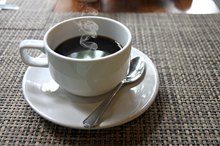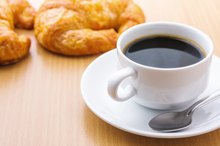What does fact checked mean?
At Healthfully, we strive to deliver objective content that is accurate and up-to-date. Our team periodically reviews articles in order to ensure content quality. The sources cited below consist of evidence from peer-reviewed journals, prominent medical organizations, academic associations, and government data.
The information contained on this site is for informational purposes only, and should not be used as a substitute for the advice of a professional health care provider. Please check with the appropriate physician regarding health questions and concerns. Although we strive to deliver accurate and up-to-date information, no guarantee to that effect is made.
Caffeine Withdrawal & Nausea
Nine out of 10 Americans ingest caffeine in some form every day, according to Judy Fortin in an April 2009 article on CNN Health. Some drink enough caffeine in coffee, tea, cola, energy drinks and shots or get enough from other sources like chocolate and alertness pills to develop a mild addiction. Caffeine addicts go through many physical and psychological symptoms when they abruptly stop their intake, including gastrointestinal effects.
Definition
Caffeine is a drug that comes from several natural sources, like cola nuts, tea leaves, coffee beans and cocoa beans. Chocolate and naturally caffeinated beverages are readily available, and the substance is added to some beverages, including energy drinks, and over-the-counter alertness remedies. People who consume large amounts of the drug daily can become addicted to it, although George Studeville of National Geographic News advises that the addiction is mainly a mild physical dependence.
- Caffeine is a drug that comes from several natural sources, like cola nuts, tea leaves, coffee beans and cocoa beans.
- Chocolate and naturally caffeinated beverages are readily available, and the substance is added to some beverages, including energy drinks, and over-the-counter alertness remedies.
Withdrawal
Can Excess Caffeine Cause Rashes?
Learn More
Caffeine withdrawal symptoms occur when you are addicted and suddenly stop consuming the drug. You can become addicted by drinking just one small cup of coffee per day, according to Johns Hopkins Medicine, although the problem is more likely if you are a heavy user. A single cup contains about 100mg of the drug, but most Americans consume about 280mg daily. Some of the physical symptoms mimic the flu, including nausea, vomiting, stiffness and muscle pain. Fatigue, sleepiness and headaches are also common, as well as psychological symptoms like irritability, depression and problems concentrating.
- Caffeine withdrawal symptoms occur when you are addicted and suddenly stop consuming the drug.
- You can become addicted by drinking just one small cup of coffee per day, according to Johns Hopkins Medicine, although the problem is more likely if you are a heavy user.
Time Frame
Nausea and other caffeine withdrawal symptoms usually start within 12 to 24 hours of cessation of caffeine consumption, Johns Hopkins Medicine advises 1. The symptoms last for up to nine days but are worse during the first one to two days of abstinence. The heaviest caffeine users experience the worst withdrawal effects.
Prevention
Why Does Caffeine Give Me a Headache?
Learn More
Unpleasant withdrawal symptoms like nausea are preventable by gradually decreasing your caffeine intake instead of stopping it completely. Gradually substitute decaffeinated coffee and tea or choose other drink options that do not contain caffeine. Your symptoms will be mild, or may not happen at all, with this gradual approach, according to Johns Hopkins Medicine.
Considerations
While nausea and other gastrointestinal symptoms usually come from caffeine withdrawal, the Mayo Clinic warns that you can upset your stomach by taking in too much of the drug. You may get nauseous, restless and experience muscle tremors, insomnia and elevated heart rate if your caffeine intake exceeds 500 to 600mg per day. Your risk of unpleasant symptoms from a high dose is greater if you do not regularly consume caffeine.
Related Articles
References
- Johns Hopkins Medicine; Caffeine Withdrawal Recognized as a Disorder; September 2004
- MayoClinic.com; Caffeine: How much is too much?; March 2011
- Sigmon SC, Herning RI, Better W, Cadet JL, Griffiths RR. Caffeine withdrawal, acute effects, tolerance, and absence of net beneficial effects of chronic administration: cerebral blood flow velocity, quantitative EEG, and subjective effects. Psychopharmacology (Berl). 2009;204(4):573-85. doi:10.1007/s00213-009-1489-4
- Shapiro RE. Caffeine and headaches. Curr Pain Headache Rep. 2008;12(4):311-5.
- Juliano LM, Griffiths RR. A critical review of caffeine withdrawal: empirical validation of symptoms and signs, incidence, severity, and associated features. Psychopharmacology (Berl). 2004;176(1):1-29. doi:10.1007/s00213-004-2000-x
- Evatt DP, Juliano LM, Griffiths RR. A brief manualized treatment for problematic caffeine use: A randomized control trial. J Consult Clin Psychol. 2016;84(2):113-21. doi:10.1037/ccp0000064
- Kole, J. & Barnhill, A. Caffeine content labeling: A missed opportunity for promoting personal and public health. Journal of Caffeine Research. 2013; 3(3); 108-113. doi: 10.1089/jcr.2013.0017.
- Mills L, Boakes RA, Colagiuri B. Placebo caffeine reduces withdrawal in abstinent coffee drinkers. J Psychopharmacol (Oxford). 2016;30(4):388-94. doi:10.1177/0269881116632374
- Rogers, P. J., Heatherley, S. V., Mullings, E. L., & Smith, J. E. Faster but not smarter: effects of caffeine and caffeine withdrawal on alertness and performance. Psychopharmacology, 226(2), 229-240. 2013 doi:10.1007/s00213-012-2889-4
- Rogers PJ, Heatherley SV, Hayward RC, Seers HE, Hill J, Kane M. Effects of caffeine and caffeine withdrawal on mood and cognitive performance degraded by sleep restriction. Psychopharmacology (Berl). 2005;179(4):742-52. doi:10.1007/s00213-004-2097-y
Writer Bio
Based in Kissimmee, Fla., Barb Nefer is a freelance writer with over 20 years of experience. She is a mental health counselor, finance coach and travel agency owner. Her work has appeared in such magazines as "The Writer" and "Grit" and she authored the book, "So You Want to Be a Counselor."









